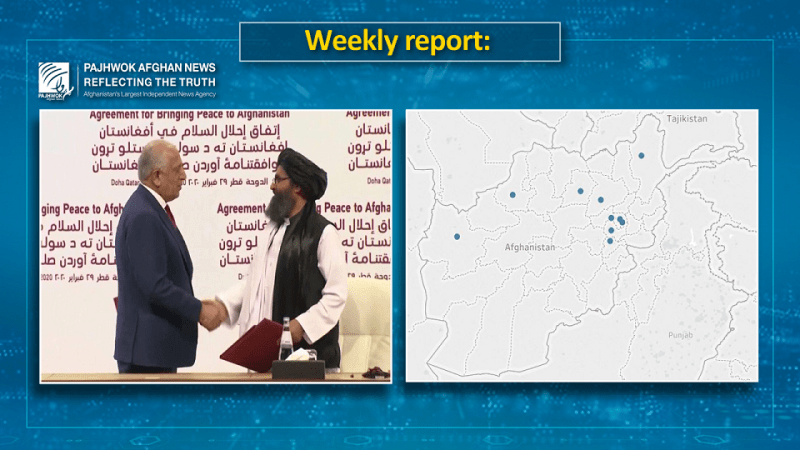KABUL (Pajhwok): Afghan and American officials last week accused each other of violating and not fully implementing the Doha Agreement, but Washington evinced an interest in engagement with Kabul despite reservations about its policies.
Last week’s major events
- On Doha deal’s 3rd anniversary, Kabul, Washington trade accusations
- Thomas West: Washington favors engagement with Islamic Emirate despite concerns
- Mujahid: Islamic Emirate ready for political cooperation with US
- Various sources once again call for lifting curbs on girls’ education, women’s work.
Casualties
Last week, 19 people were killed in separate incidents of violence across the country.
Two Daesh affiliates were killed and a third captured alive during an operation by security forces in the 17th district of Kabul city. Three kidnappers were killed and a fourth arrested and a man rescued from their clutches in Kabul.
In western Herat province, six Daesh militants including a woman were killed during an operation in Herat city last night.
According to reports, unidentified gunmen killed a person in Parwan, a young man in Logar, a doctor in Samangan, a shepherd in Faryab, and a person killed his wife in Baghlan.
A suicide bomber was killed before reaching his target in northeastern Badakhshan province last week.
Note: The casualties’ figures are based on reports reaching Pajhwok Afghan News. Some incidents may have gone unreported or sources provided incorrect figures.

In the previous week, according to sources, six people were killed and two others were injured in various incidents across the country.
Before the regime change in August 2021, hundreds of civilians, government forces and insurgents would get killed and wounded every week.
Doha agreement and world’s interaction with Afghanistan
Last week, the Afghan Embassy in Iran and the Afghan Consulate in Istanbul were officially handed over to the Islamic Emirate without recognizing their government.
The Islamic Emirate has so far sent its diplomats to Pakistan, Turkmenistan, China, Qatar, Turkey and Russia.
The Doha Agreement was signed on February 29, 2020 between former US special representative for reconciliation in Afghanistan Zalmay Khalilzad and Taliban’s top negotiator Mullah Abdul Ghani Baradar in Doha.
The agreement paved the way for complete withdrawal of foreign forces from Afghanistan and intra-Afghan talks.
The intra-Afghan talks that started in Doha failed to reach a conclusion and the previous government fell on August 15, 2021 and was replaced by the current caretaker government.
Mullah Abdul Ghani Baradar, now deputy prime minister, told a gathering marking the third anniversary of the deal in Kabul, said the Islamic Emirate opened a new chapter in the history of Afghanistan by signing the Doha agreement.
He accused Washington of repeatedly violating the Doha agreement, insisting the Islamic Emirate wanted good internation with all countries, but the US did not want to interact with the Afghan government and was not allowing other countries to do so.
But the spokesman of the US State Department, Ned Price, said the Islamic Emirate was not committed to the Doha Agreement.
Zalmay Khalilzad, former US special representative for reconciliation in Afghanistan, called the Doha Agreement a good opportunity for Afghanistan and asked the Islamic Emirate and the United States to take advantage of this opportunity.
In an interview with a private broadcaster, the US special envoy for Afghanistan said the caretaker government had not taken significant steps towards normalisation.
Thomas West said the US had concerns about the interim government’s policies towards Afghans. The IEA did not have a permanent representative at the UN and formal links with international financial institutions, he noted.
West added the Afghan rulers did not have access to the country’s frozen assets abroad. “I do not envision that we will budge on any of these issues until they make more responsible decisions.”
Despite its concerns about the current government’s policies toward the Afghan people, the US desired to engage with them, he explained.
“We do favour a policy of engagement, that is why I met Taliban leaders in December,” he argued, indicating future meetings with IEA representatives on American interests in Afghanistan.
However, Islamic Emirate spokesman Zabihullah Mujahid said US representatives had been and were in contact with them. “They should tell us what they want from the Islamic Emirate. The Islamic Emirate has taken effective steps and is ready to protect the relations between the two countries and to change from war situation to political and cooperation situation.”
In its latest report, the Special Inspector General for Afghanistan Reconstruction (SIGAR) blamed the Doha agreement, withdrawal of foreign forces, differences between former president Ashraf Ghani and Abdullah Abdullah and some of Ghani’s decisions for the collapse the Afghan forces.
Girls’ education and human rights
US special representative Thomas West and former Senate chairman Fazl Hadi Muslimyar discussed the political, humanitarian and economic situations of Afghanistan and the need for national dialogue between the Afghans.
US Secretary of State Antony Blinken told the United Nations Human Rights Council meeting in Geneva that Afghanistan’s caretaker government had closed the door of relations with the international community by stopping girls’ from education and women from work.
Also, Saudi Arabia, Germany, Turkey and the United Nations Special Representative for Human Rights criticized the restrictions on girls’ education and women’s work in Afghanistan and asked Kabul to cancel its decisions.
About women’s work, Zabihullah Mujahid said women were allowed to work in sectors where they were required like health, passport office, education, police and prisons.
He said the girls’ education would resume after necessary conditions were put in place.
Some residents of southeaster Khost province also asked the government to reopen schools for girls above the sixth grade.
Previously, various sources had requested the opening of girls’ schools above the sixth grade as well as universities for girls.
Two days ago, the Ministry of Higher Education said public-sector universities in cold provinces, including Kabul, would reopen next week only for male students.
ma








GET IN TOUCH
NEWSLETTER
SUGGEST A STORY
PAJHWOK MOBILE APP